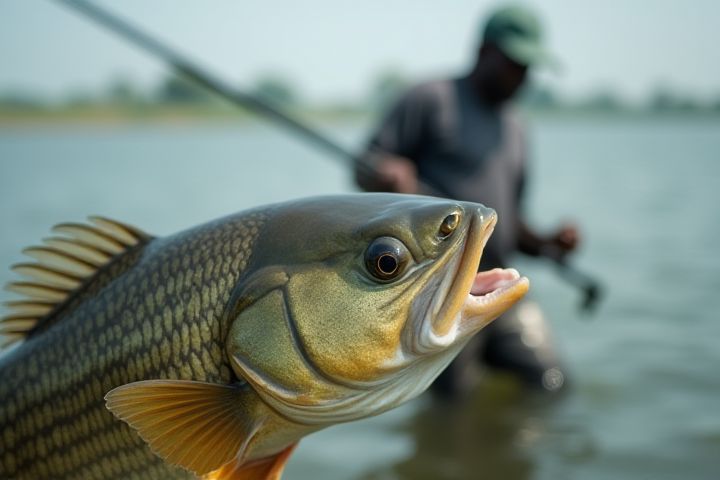
Fishing in Nigeria plays a crucial role in the nation's economy and food security, contributing significantly to the livelihoods of millions. The country's extensive waterways, including rivers, lakes, and coastal areas, support diverse fish species, making it a prime location for both artisanal and commercial fishing. Freshwater fish, such as tilapia and catfish, alongside marine species like shrimp and mackerel, are commonly harvested. The fishing industry faces challenges, including overfishing, pollution, and inadequate infrastructure, which impact sustainability and growth. You can support local fishing communities by choosing sustainably sourced products that encourage responsible practices in Nigeria's rich aquatic ecosystems.
Diverse fish species
Fishing in Nigeria showcases a rich variety of fish species, contributing significantly to both local diets and the economy. Key species include tilapia, catfish, and mackerel, found in freshwater bodies like rivers and lakes, as well as in coastal marine environments. The fishing industry not only provides livelihood opportunities for many communities but also supports trade and export, enhancing Nigeria's position in the regional fish market. Sustainable practices and aquaculture initiatives are increasingly vital in ensuring the long-term health of these diverse fish populations.
Major fishing zones
Nigeria's fishing industry thrives primarily in several major fishing zones, each with distinct ecological characteristics. The Niger Delta, renowned for its brackish waters, supports diverse marine species, making it a vital area for both commercial and artisanal fishing. The Lagos Lagoon serves as a significant hub for fishing activities, where you can find a variety of freshwater and saltwater fish. In the northern regions, the diverse freshwater ecosystems of rivers and lakes, particularly in areas like Lake Chad, provide ample resources for local fisheries, contributing to food security and livelihoods.
Inland and coastal fisheries
Fishing in Nigeria encompasses both inland and coastal fisheries, providing a diverse range of aquatic species. Inland fisheries thrive in various water bodies such as rivers, lakes, and reservoirs, where species like catfish and tilapia are predominantly caught. Coastal fisheries exploit Nigeria's extensive coastline along the Atlantic Ocean, yielding abundant marine species including shrimp, crab, and different fish types. Sustainable practices in both sectors are essential to support local economies and ensure the preservation of aquatic ecosystems.
Traditional fishing methods
Traditional fishing methods in Nigeria encompass a diverse array of techniques and tools that reflect the rich cultural heritage of various ethnic groups. Techniques such as gillnet fishing, trap fishing, and the use of woven baskets highlight the sustainable practices employed by local fishermen to harvest fish from rivers, lakes, and coastal areas. The use of canoes and hand-tied nets showcases craftsmanship passed down through generations, ensuring the preservation of local fish species and ecosystems. Engaging with these methods not only supports local economies but also offers a unique insight into Nigeria's aquatic biodiversity and community traditions.
Artisanal fishing communities
Artisanal fishing communities in Nigeria play a crucial role in the country's economy and food security, providing livelihoods for millions and contributing to local cultural practices. These small-scale fishers utilize traditional methods and sustainable practices, primarily targeting species such as tilapia, catfish, and shrimp in rivers, lakes, and coastal waters. With the rise of global interest in sustainable seafood, many artisanal fishers are adapting to eco-friendly practices to meet market demands while preserving marine biodiversity. Engaging with these communities not only supports their economic development but also enhances the conservation of aquatic ecosystems vital to Nigeria's natural heritage.
Aquaculture development
Aquaculture development in Nigeria plays a crucial role in boosting the country's fish production and enhancing food security. With abundant natural resources, Nigeria is increasingly investing in sustainable fish farming practices that include tilapia, catfish, and other species tailored to local demand. Climate-friendly aquaculture techniques are being adopted to mitigate environmental impact, ensuring responsible resource use. By prioritizing infrastructure improvements and training for fish farmers, you can contribute to the growth of this vital sector, ultimately increasing both employment opportunities and nutritional access for the population.
Fishing regulations
Fishing regulations in Nigeria are designed to promote sustainable practices and protect marine ecosystems. The Nigerian government sets specific quotas for different species to prevent overfishing and preserve biodiversity. Moreover, licenses are required for commercial fishing operations, ensuring that fishers adhere to environmental standards. You should be aware of these regulations, as compliance not only supports conservation efforts but also enhances the long-term viability of the fishing industry.
Economic significance
Fishing in Nigeria plays a crucial role in the economy, contributing significantly to food security, employment, and national revenue. The country boasts abundant freshwater and coastal resources, which support both artisanal and commercial fishing activities, thus providing livelihoods for millions of Nigerians. Local fish species, including tilapia and catfish, are vital for the diet of many communities, while export activities also generate foreign exchange. Efforts to enhance sustainable fishing practices are essential for preserving marine biodiversity and ensuring the long-term viability of this important economic sector.
Environmental challenges
Fishing in Nigeria faces significant environmental challenges that threaten aquatic ecosystems and livelihoods. Overfishing, driven by increased demand for seafood, depletes fish stocks, disrupting the natural balance of marine biodiversity. Pollution from industrial waste, agricultural runoff, and oil spills further contaminates water bodies, impacting fish health and local communities dependent on clean water sources. Climate change also exacerbates these issues by altering weather patterns, leading to unpredictable fishing seasons and habitat degradation.
Stakeholders and cooperatives
Fishing in Nigeria is significantly influenced by various stakeholders, including local fishermen, government agencies, and non-governmental organizations, each contributing to the industry's sustainability and economic development. Cooperatives play a vital role in enhancing collaboration among fishers, providing access to resources, training, and financial support, which helps improve yield and profitability. By fostering community engagement and responsible fishing practices, these cooperatives can combat overfishing and ensure the preservation of aquatic ecosystems. Your involvement in local fisheries cooperatives can lead to the advancement of sustainable methods that directly benefit both the economy and the environment.
